BLOG-E
EcoCiv Blog - Test
EcoCiv Podcast: Episode 4 – Karenna Gore: Earth Ethics
EcoCiv’s managing director, Jeremy Fackenthal interviews author and journalist Karenna Gore. They talk about Karenna’s work as the director for the Center for Earth Ethics in New York, the moral dimensions of the ecological crisis, her interest in American indigenous traditions, studying liberation theology with James Cone, challenging GDP as a measure of social well-being, connections
EcoCiv Podcast: Episode 3 – Isabella Alexander
EcoCiv’s executive vice president, Andrew Schwartz talks with the anthropologist Isabella Alexander. They have a fascinating conversation about Isabella’s important work on issues relating to transnational migration, her current projects as a writer and documentary filmmaker, how migration issues intersect with global climate disruption, and how she finds hope while raising awareness about complex systemic injustices.
EcoCiv Podcast: Episode 2 – Jeremy Lent
For this week’s episode, Andrew Schwartz speaks with Jeremy Lent, who is a writer and public intellectual. He is the author of the award-winning book, The Patterning Instinct, which traces how different cultures patterned meaning into the universe and how that has affected history. Guardian journalist George Monbiot called it “the most profound and far-reaching book I

Fixing the Hole in the Boat: The Radical Vision of Ecological Civilization
How do boats float? As a child, growing up along the Columbia River, this was something I found particularly puzzling after seeing massive steel ships glide atop the water. I didn’t understand the science behind displacement and buoyancy, but I did know that if your boat takes on too much water you’re going for a swim.
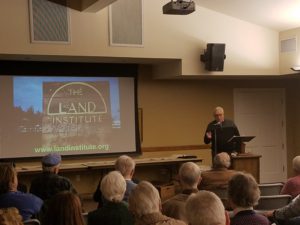
Farmers and Philosophers: Agriculture and Philosophies of Organism
Agriculture has always been a defining characteristic of civilization. Yet unsustainable agricultural practices are a major reason why we now find ourselves in the midst of a serious environmental crisis. While discussions about regenerative and sustainable agricultural practices are increasingly common, there is still very little work being done to analyze the underlying frameworks―the worldviews―that ground our

Two elder scholars asked, “Are you happy?”
By Kumsil Kang, Executive Director of People for Earth, lawyer Two elder scholars from the United States visited Korea to attend the International Conference on Transition Cities hosted by Seoul on November 11, and the International Conference on Ecological Civilization held at Paju from December 12 to 14. They were John B. Cobb, Jr., Professor Emeritus
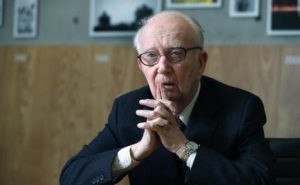
“If Jesus is born now, he would first save the ruined environment”
An interview with international ecological theologian John Cobb By Kim Hwan Young All belief systems, including philosophy, religion, and ideology, continue to change and evolve. The conservative insistence on maintaining the purity of heritage from founders and doctrines often fails to meet the practical need to adjust to worldly changes. But if there is excessive deviation
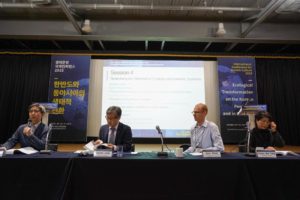
Is an Economic System in Harmony with Ecology Possible?
By Han Gui-Young 한겨레경제사회연구원 사회정책센터장 People for Earth Forum “Earth and People” hosts International Conference on Ecological Civilization If the entire world is to maintain Korea’s level of consumption, 3.5 earths will be needed Ecological conversion is no longer a task that cannot be postponed Immediately effective ecological conversion is more cost effective as well Practical
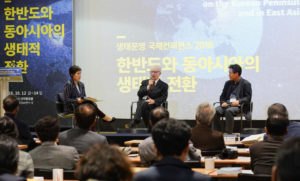
“Ecological civilization must be realized with an ecological economy and education that serves the Earth”
By Kim Yu-Jin “You may believe that it is too late to avoid the consequences of climate change. But if we discontinue unsustainable practices now and make the correct choices, we can save billions of people.” Urgency emanated from the words of Dr. John Cobb, Professor Emeritus of the Claremont Theological Seminary who is considered to
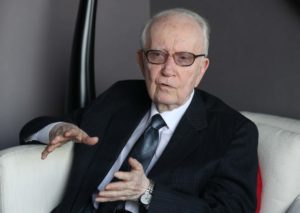
“Civilization will collapse”… What are the remaining tasks?
Do you remember the terrible heat of last summer?Temperatures that forbade restful sleep because they didn’t drop below 90 degrees? Receiving news of record-breaking temperatures every day, people must have begun to understand the serious nature of climate change. But as the cool breeze returned, those memories faded. How long can such forgetting continue? ‘Is it
